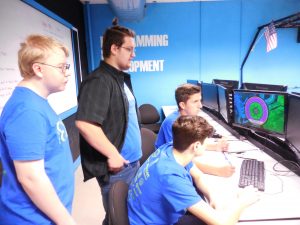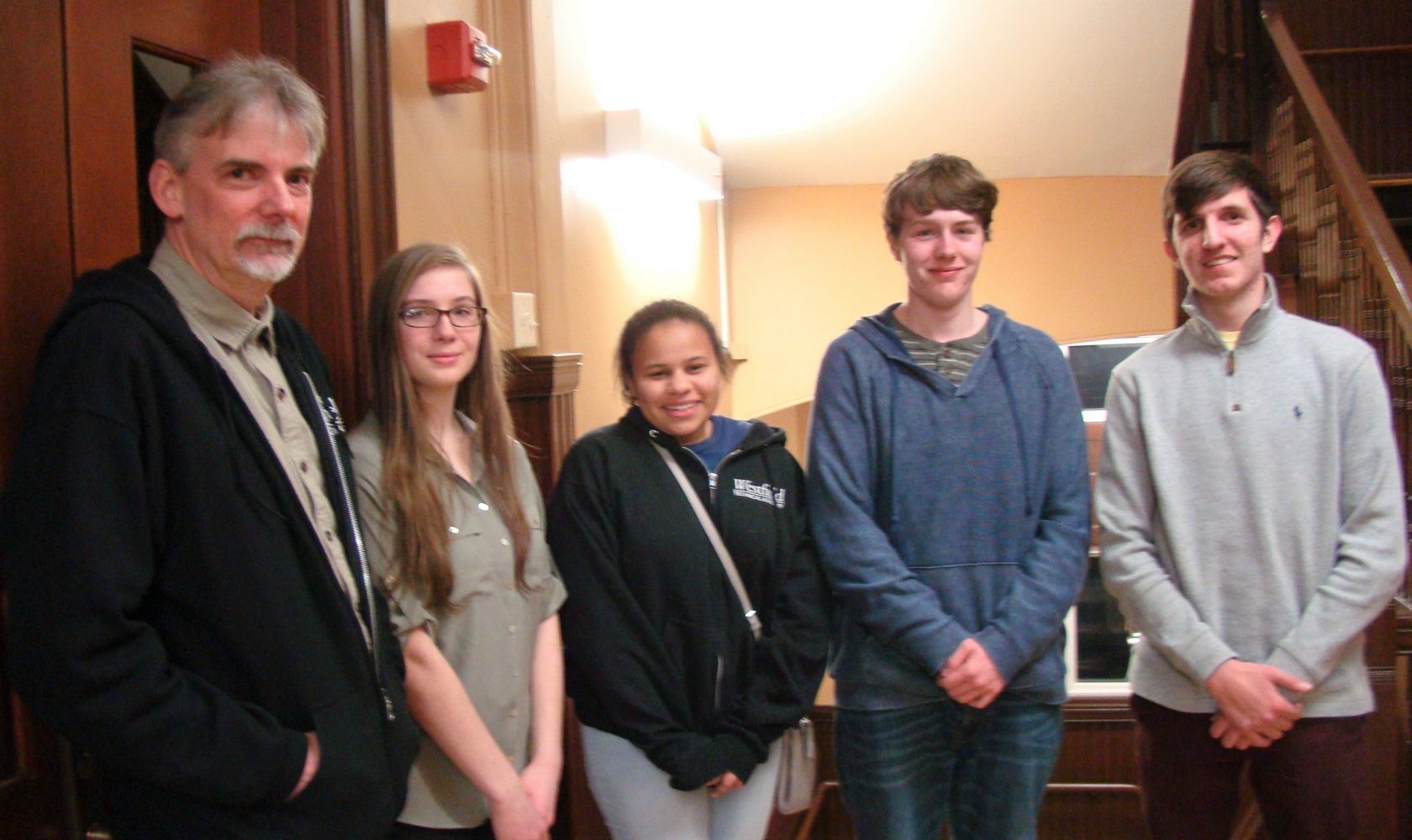
WTA IT instructor Jeffrey Richardson, sophomore Ksenia Zinchenko, and juniors Deajah Barbour, Orion Dirgo and David Tikhonchuk from the CyberPatriot teams. (Photo by Amy Porter)
WESTFIELD – Students in the Internet Technology shop at Westfield Technical Academy have just finished competing in CyberPatriot, the National Youth Cyber Education Program’s Cyber Defense Competition. Several of the students, along with WTA IT instructor Jeffrey Richardson described the competition and its purpose to the School Committee on Monday night.
The competition puts teams of high school and middle school students in the position of newly hired IT professionals tasked with managing the network of a small company. In the rounds of competition, teams are given a set of virtual images that represent operating systems and are tasked with finding cybersecurity vulnerabilities within the images and hardening the system while maintaining critical services in a six hour period, according to a description on www.uscyberpatriot.org.
Richardson said the students competed once a month for five months for the competition, which is in its third year at WTA. Richardson said the first year he invited the seniors to compete. The following year, the school held a CyberPatriot summer camp, after which juniors and seniors competed in the competition. This year, sophomore, juniors and seniors all competed.
Richardson showed the School Committee a video clip from the Today show about CyberPatriot, which stated that in the next five years, there will be a worldwide job shortage of 2 million in cybersecurity, with 300,000 jobs available in the field today.
An Air Force spokesperson on the show described how young people are the answer to a national security problem, and said the program was designed to spark interest in the field when the competition was started by the Air Force ten years ago.
In response to a question from School Committee member Cindy Sullivan as to where the 300,000 jobs are, Richardson said a lot of them are in Massachusetts, mostly out east, but “any company today needs cybersecurity,” he said.
There are three divisions in the competition; open high school, junior ROTC, and middle school.

Assistants John Hale and Mark Mkrtchian (Class of ’17) help then sophomores Tim Yurovskiyh and David Tikhonchuk find and fix cyber threats at the 2017 summer CyberCamp.(WNG File Photo)
Sophomore Ksenia Zinchenko said she started by participating in the CyberPatriot camp two summers ago. She said WTA competes in the open high school division, where everybody competes in the first two rounds. The second round is divided into three tiers; platinum (the top tier), gold and silver. After the state round, the top 25% of their tier go into semi-finals in that tier. The gold and silver teams end at the semi-finals, and the twelve top teams in the platinum tier go on to nationals.
Last Saturday, the sophomores, who scored 72% in the state competition and made the gold tier, competed in the semi-finals, although the results were not yet available. The gold tier does not go further than the semi-finals.
Junior David Tikhonchuk said the junior team practiced in between competitions, and bonded as a team. He described the competition as having a virtual computer within the computer that is infected with vulnerabilities. He said in the first competition, there were 20 vulnerabilities to be discovered and fixed; and in the second, 60 or more.
School Committee vice-chair Ramon Diaz, Jr. asked Tikhonchuk to give an example of the vulnerabilities. He described users that aren’t supposed to be there, or who are insecure and need their password changed; finding malware, and in Linux, looking for open ports and back doors.
Tikhonchuk said the junior team reached the top platinum tier, and missed the semi-finals by 3/10ths of one percent.
Richardson elaborated, saying the junior team scored at 95% in the state, placing third, with less than 10 points out of 400 separating them and the first place finisher.
He also singled out the accomplishments of one of the members of the junior team, Deajah Barbour. To explain, he said as part of the competition, there are virtual machines, a software computer inside of the physical computer, called “images,” referred to by Tikhonchuk.
Richardson said they receive three to four images for each competition, and members of the team will try to specialize in one of those areas. In addition, CyberPatriot has a network test, which pulls parameters and concepts from the Cisco Certified Network Assoc. In competition, the network simulation (PacketTracer) uses the Cisco system for designing networks, and provides competitors with partially developed networks that have problems or have been built incorrectly, and need to be corrected and fixed. Students get points for fixing them correctly.
Last year, Barbour specialized in the Cisco Networking on the then sophomore team, (which also made the platinum tier last year, with a lower score than they did this year as juniors). Richardson said only 19 teams in the country got a higher score in networking than she did, out of 2500 teams. Richardson said he has not yet received those statistics for this year’s effort, where Barbour played the same role on the team.
“They’re very, very competitive,” Richardson said about the juniors. He repeated that they only narrowly missed competing in the semi-finals, scoring three tenths of one percent less than the last qualifier. “They are motivated to get there next year,” Richardson said, adding that he thinks they are more motivated to do better next year, than if they had done it this year.
The top twelve scoring teams in the semi-finals in the platinum tier move on to the nationals, an all-expenses paid trip to Baltimore, MD for the National Finals Competition where they can earn national recognition and scholarship money, and is the only part of the competition where teams travel to compete.
“We’re hoping this year’s sophomores and juniors will improve their performance next year,” he said.
Richardson said the seniors didn’t make it into the top 25% teams in the state. He said they were interested in coming in and trying it, but hadn’t invested the time in the competition.
Richardson said cybersecurity is woven into the IT curriculum for all students. He said he personally teachers Cisco networking and Linux, and said, “I’ve been trying to build in some of the concepts they’ll see if they compete.”
He said the majority of students from IT go on to college. Their shop has an articulation agreement with STCC, allowing them to earn 21 credits towards their Associate Degree through their work at WTA. Richardson also teaches one night a week at STCC, and teaches the same coursework to his classes at school.
The shop also has a few seniors out on co-op; one who recently competed for a job posting in the IT Department in the Town of Agawam and won the job, according to Richardson. He said that student works under a supervisor during career technical weeks, and the bi-weekly performance review is his grade for the shop weeks.
One interesting paradigm about the CyberPatriot competition, according to Richardson, is that teams are not allow to share their findings with other teams from the school. He said the team members may talk amongst themselves, but they can’t tell other teams, because it violates the ethics of the competition. “According to the rules, the junior team can’t share with the sophomore team. It puts the pressure on for each team to build up itself,” he said, adding, “I embrace that concept, because of how hard the junior team has worked. The victory that the sophomore team gets should come from their own merits. If top teams handed down (their findings), it wouldn’t be a fair competition.”
Richardson said they will continue to compete next year. He said it is gaining momentum with the shop area, because it gives the kids the ability to test their skills; a yardstick to measure how they’re doing. “It also looks good on a resum?,” he said.
Richardson said the two teams, sophomore and junior, were “exceptionally into it,” getting together outside of class to work on their skills.
“It’s easier to educate a motivated student. This contest provides an avenue to foster that motivation,” Richardson said. He said just having the school and the School Committee recognize their performance is motivating. “Unlike basketball, this is not a spectator sport. They’re outstanding at what they’re doing, but nobody sees that. Just getting the recognition helps,” he said.


